Mendicino says Lucki warned him of 'urgent' threat of violence in Alberta before Emergencies Act was invoked
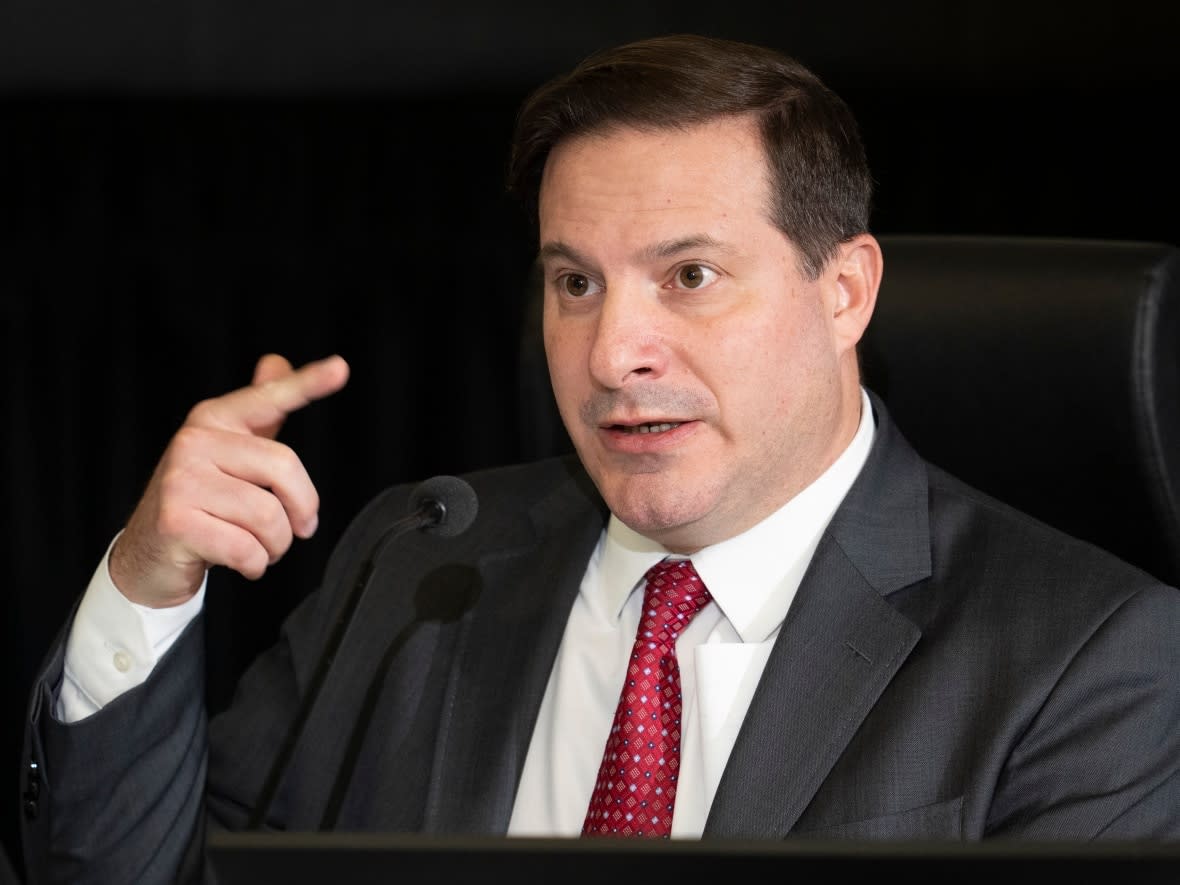
Public Safety Minister Marco Mendicino says the head of the RCMP shared with him sensitive police information the day before the government decided to invoke the Emergencies Act — and warned him that some protesters in Alberta were willing "to go down with the cause."
"This was a threshold moment for me. There is no doubt about it," Mendicino told the Public Order Emergency Commission Tuesday.
The minister said he spoke with Commissioner Brenda Lucki on Feb. 13. During that conversation, he said, Lucki updated him on plans to execute a police operation at the blockade near Coutts, Alta.
"She did call me and only me," Mendicino testified on Tuesday.
"She underlined, for me, that the situation in Coutts involved a hardened cell of individuals armed to the teeth with lethal firearms, who possessed a willingness to go down with the cause."
Court records show the RCMP had undercover officers embedded with the protesters.
"Lives literally hung in the balance," said Mendicino. "For me, this represented far and away the most serious and urgent moment in the blockade to this point in time."
WATCH: Lucki warned Mendicino that Alberta border blockade could turn violent:
Mendicino was questioned about a Feb. 13 email Lucki sent to his chief of staff Mike Jones, previously entered into evidence.
In it, she wrote that police had not yet exhausted all available tools. The email chain shows Jones forwarded the message to Mendicino.
The ministers said Lucki was expressing a different view in his conversations with her.
"It also spoke volumes to me about the commissioner's state of mind, which was that we were potentially seeing an escalation of serious violence with the situation in Coutts," he said.
Mendicino said he told Lucki he couldn't keep the information about the potential for loss of life in Coutts to himself. He said he shared it with Prime Minister Justin Trudeau and Katie Telford, his chief of staff — but not with the cabinet table, due to the information's operational sensitivity.
"I was extremely concerned that this had reached a new height of both urgency and emergency," he said.
The blockade and protest at the Coutts border ended after a Feb. 14 pre-dawn operation that executed warrants on trailers and property. That operation resulted in RCMP seizing more than a dozen firearms, as well as ammunition and body armour.
Later that day in Ottawa, Trudeau announced that the government would be taking the unprecedented step of triggering emergency powers.
Fourteen people have been charged criminally out of Coutts. Four men have been accused of conspiracy to murder RCMP officers.
Mendicino was 'amped' about OPS response: memo
Mendicino also was paying close attention to the actions of law enforcement in Ottawa, texts entered into evidence Tuesday showed.
In a Feb. 6 exchange, Mendicino's chief of staff Jones and the prime minister's deputy chief Brian Clow discussed how hundreds of vehicles were parked on Wellington Street, in front of Parliament Hill, and other downtown streets.
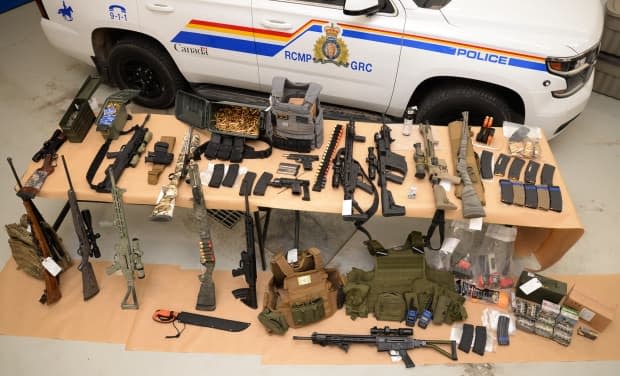
"So, my boss is pretty amped. He's concerned that [Ottawa Police Service] have lost jurisdiction as there's no control at all over what's happening on Wellington," wrote Jones. "Also concerned about PM safety if he is returning to this this week."
Jones wrote that Mendicino "wants to go out and say that OPS needs to get control over the situation and if they need more from OPP they should make that clear but they should get working on removals within the next 24 hours."
"And if they aren't going to do it then we may need to look at other measures."
Mendicino told the inquiry Tuesday that, at the time, the government was considering additional measures for local police, including RCMP resources.
"How do we get more boots on the ground to help Ottawa police?" he said. "When police tried to enforce the law, they were overwhelmed."
Texts a point to 'frosty' call between Mendicino and Sylvia Jones
The commission also got a glimpse of a testy call between Mendicino and former Ontario solicitor general Sylvia Jones about how to handle last winter's convoy protests.
In the Feb. 11 exchange, Mendicino's chief of staff and Samantha Khalil, director of issues management at the Prime Minister's Office, discussed wanting Jones at the table during trilateral meetings.
"Can have my boss reach out again [to Sylvia Jones] but last call got pretty frosty at the end when [Mendicino] was saying we need the province to get back to us with their plan. 'I don't take edicts from you, you're not my f--king boss," Mike Jones wrote, referring to Sylvia Jones's response.
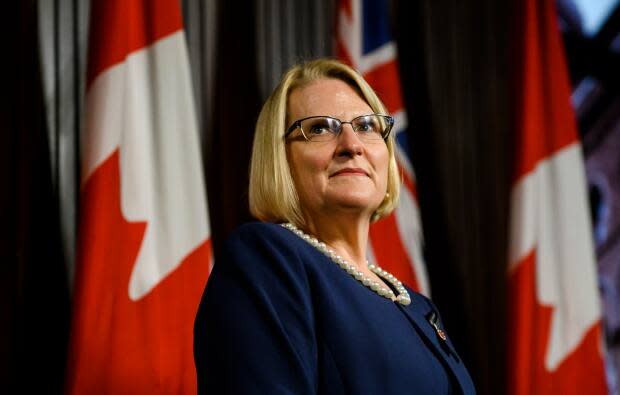
Mendicino said a phone conversation he had with Jones did result in "colourful vernacular."
"The real thrust of the call was to engage Minister Jones to understand exactly where her thinking and the government of Ontario's thinking was in responding to the request of the Ottawa Police Service to get additional resources," Mendicino testified Tuesday.
"It was an important engagement, it was obviously a very stressful time. I think we could all be forgiven for some rather blunt language."
Mendicino said he and Jones have a supportive rapport.
Tensions between Ontario, federal government
It's not the first time the commission has heard of friction between the Ontario and federal governments earlier this year over how to address the protests in Ottawa and the blockade at the Ambassador Bridge in Windsor.
The inquiry heard that during a Feb. 8 private call with then-Ottawa mayor Jim Watson, Trudeau accused Ontario Premier Doug Ford of hiding from his responsibilities during the Freedom Convoy protests.
WATCH | 'They were overwhelmed:' Mendicino on police during self-described 'Freedom Convoy':
"Doug Ford has been hiding from his responsibility on it for political reasons, as you highlighted," Trudeau said, according to a readout of the call, which is not an exact transcript of the conversation. "Important we don't let them get away from that."
A few weeks later, the commission heard from a senior Ontario government bureaucrat who alleged the federal government was trying to force the province to take the lead on ending the blockades.
Mario Di Tommaso, Ontario's deputy solicitor general, told the inquiry about a meeting where Trudeau's national security and intelligence adviser Jody Thomas asked whether the provincial government would take a more active role in the Ottawa protests if they were happening in Kingston, Ont.
"This question was all about, from my perception, the federal government wanting to wash its hands of this entire thing," Di Tommaso said.
Ford has said he supported the federal government's decision to invoke the Emergencies Act.
A Federal Court judge ruled that Ford and Jones, who is deputy premier, do not have to testify at the Emergencies Act inquiry because of immunity provided to them by parliamentary privilege.
LeBlanc alleges Kenney felt they had 'screwed the pooch'
Intergovernmental Affairs Minister Dominic LeBlanc testified Tuesday night about his conversations with premiers during the protest and regarding the invocation of the Emergencies Act.
In an interview he gave the commission in September, he said Ontario Premier Doug Ford and his government were less engaged on the file in the early days of the protest.
But according to a summary of that interview, LeBlanc "felt they became more engaged publicly and more engaged with the federal counterparts once the Ambassador Bridge was blocked, because of the economic damage that was being sustained in Southwestern Ontario."
LeBlanc also said Alberta Premier Jason Kenney was frustrated with the federal government's response and was seeking heavy military tow trucks to help clear Coutts.
In a text message to Mendicino and Transport Minister Omar Alghabra, entered into evidence Tuesday, LeBlanc passed on a message he received from Kenney.
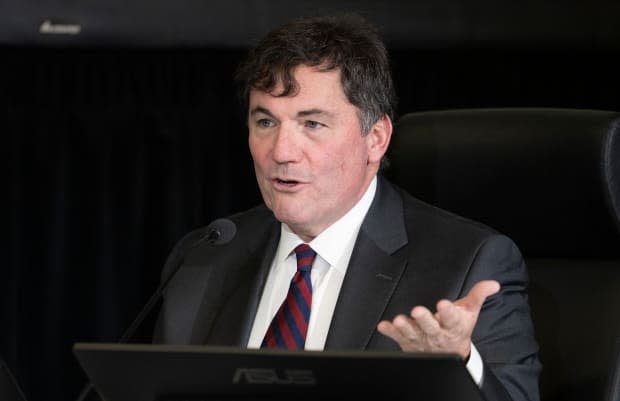
LeBlanc wrote that Kenney told him "your guy has really screwed the pooch." He said the premier complained about his inability to source "heavy equipment from private vendors to move these freaking trucks off the border because these crazies are making death threats."
"Speaking of bonkers," Alghabra responded in the ministers' group chat.
"Totally," responded LeBlanc.
LeBlanc was asked about a meeting with the premiers he addressed on the morning of Feb. 14, during which the government announced its intention to invoke the Emergencies Act.
The Emergencies Act requires that the federal government consult with premiers before triggering its emergency policing powers.
Lawyers for Alberta and Saskatchewan have questioned the quality of those consultations before the commission.
Counsel for the province of Saskatchewan argued during opening submissions before the Public Order Emergency Commission that the federal government had decided to invoke the act already before the call on Feb. 14.
"The call was not so much about consulting as it was about telling," said lawyer Michael Morris.
LeBlanc told the commission that the prime minister was clear on the call that the government had not yet made a decision.
"Minister LeBlanc said he believed this to be true, given that no decision had been announced at the end of the full cabinet meeting the night before," his summary said.
"He explained that cabinet never votes; rather, the prime minister determines whether or not there is a consensus, decides what direction should be taken, and announces this to cabinet."
Lawyer ejected from hearing
Tuesday's hearing saw tensions boiling over, with Commissioner Paul Rouleau temporarily ejecting a lawyer representing some of the protest organizers.
Brendan Miller, lawyer for Freedom Corp., asked for Mendicino's director of communications Alexander Cohen, who was in the hearing room, to be called as a witness.
Rouleau replied that the commission had to stick to its schedule.
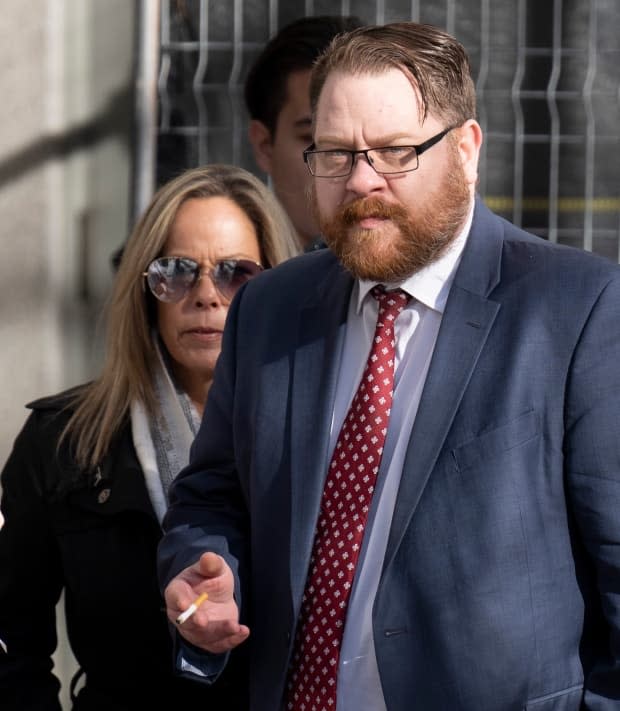
"Sir, the schedule's not as important as getting at the truth," Miller shot back.
"There's no question we want to get at the truth, but you know what, it's a very complex issue and it's not all about what you want," Rouleau said.
Miller told reporters outside of the Library and Archives building in Ottawa, where the hearings are being held, that he's made several applications to call other witnesses and to ask that documents provided by the federal government be unredacted.
"I'm trying to do my job," he said.
Miller later apologized for speaking over Rouleau and resumed cross examination.


